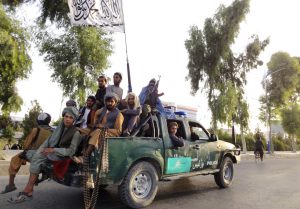The right-wing politics of U.S. Senator Mitch McConnell are not everyone’s cup of tea. But he’s an old stager and he was right about the Taliban shaping-up to retake of Afghanistan, when he said: “This debacle was not only foreseeable, it was foreseen.”
“The Biden Administration has reduced U.S. officials to pleading with Islamic extremists to spare our Embassy as they prepare to overrun Kabul,” he said.
“The latest news of a further drawdown at our Embassy and a hasty deployment of military forces seem like preparations for the fall of Kabul. President Biden’s decisions have us hurtling toward an even worse sequel to the humiliating fall of Saigon in 1975.”
The sheer speed of the fall as the militia fanned out across the country was as breathtaking as it was heartbreaking for the Afghans who believed in America and those who backed Washington’s efforts over two decades to rescue what was a failed state.
It was an embarrassment for the victims of the 9/11 attacks – orchestrated by Osama bin Laden and his al-Qaeda network, who lived, fought, and plotted with the Taliban – and the bombings and strikes across the planet that followed in the War on Terror.
To abandon Afghanistan and essentially hand it back to the Taliban – a terrorist group that owed much of its history to key supporters in Pakistan like the former prime minister Benazir Bhutto – was humiliating.
Comparisons between the fall of Kabul and Saigon in the aftermath of a U.S. military withdrawal are inevitable. But while the similarities are striking there are also key differences.
Significantly was an overriding North Vietnamese fear of U.S. President Richard Nixon and the very real prospect of a resumption of bombings should they cross the 17th parallel into South Vietnam in violation of the peace agreement reached in 1973.
Watergate changed that. As Nixon stumbled towards resignation the North Vietnamese were emboldened and gambled that a lame duck administration, and then a new president in Gerald Ford, would abandon their allies in South Vietnam once the communist tanks had crossed the border.
Hanoi had two years to prepare and the south crumbled.
Like the North Vietnamese communists, the Taliban never had any intention of honoring the peace agreement struck last year with Biden’s predecessor Donald Trump, as flimsy as it was.
But unlike the communists the Taliban held no fears of the Americans, who just wanted out. They launched a well-planned, well-armed offensive and by Sunday their objective had proven all too easy.
The U.S. spent $88 billion on training and equipping the Afghan army – two-thirds of its total foreign aid budget allocated to Afghanistan since 2002. Where were they as the Taliban advanced?
And the notorious warlords, many of them sworn enemies of the Taliban: where were they?
Afghanistan’s endless civil wars, the factional and ethnic brawling of the last half-century, had resulted in an ocean of constantly shifting alliances and double dealing that gave rise to an old adage, “you can rent an Afghan but you can’t buy one.”
Back in 2009, CNN reported that some experts believed the U.S. military was paying militiamen to quit the Taliban in what was dubbed a “temporary loyalty program.”
Warlords are paid to fight and sometimes they are paid not to fight and in the handful of weeks leading up to the fall of Kabul, the military evaporated and the warlords simply opened the gates and let the Taliban march through in their convoys of Japanese SUVs.
The question is: Who paid them?
For clues, one should look at who has the most to gain from the Taliban’s return to power.
Put simply, an offensive of this magnitude would not be possible without the knowledge of Pakistan or its intelligence services, who are adept at whispering from the sidelines.
The Taliban shattered what was called the Agreement for Bringing Peace to Afghanistan. Biden is neither a Nixon nor a Ford, but the future of his administration is hanging on what comes next and his options – including a resumption of military strikes – are many.
Luke Hunt has written about Afghanistan since his first of many tours in 1998 and he authored the Vietnam war book, Punji Trap. He can be followed on Patreon and on Twitter @lukeanthonyhunt.

































